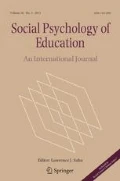Abstract
The present experimental study explores whether teachers are ‘clever’ thinkers when assessing students’ credibility, i.e., saving cognitive resources when possible and making accurate judgments. Participants were asked to decide whether student statements about using unfair means during a test were true or deceptive. First, participants’ own judgment tendency (a true vs. lie tendency) was manipulated by informing them about the resource-consuming consequences of their judgment, i.e., giving additional explanations for each student statement they judged as being true (vs. a lie). Before actually judging the students’ statements they were informed about the judgment tendency of other teachers about the upcoming student statements (true vs. lie tendency of other teachers). It was assumed that participants ‘cleverly’ choose a resource-saving judgment tendency and show a true (vs. lie) tendency when additional explanations for their lie (vs. true) judgments were required. Moreover, it was assumed that participants’ accuracy rate would be higher if their own judgment tendency opposed the judgment tendency of other teachers. The results indicate that teachers are ‘clever’ thinkers. Practical implications are discussed.


Similar content being viewed by others
Notes
To avoid any conformity bias (Asch 1956), we informed participants that participants of the short pretest did not have to give additional explanations. We expected that participants would be consistent with their group, and therefore show the same tendency to rate the students’ credibility. Thus, we offered them an opportunity to devaluate their group’s answering tendency by telling them that participants of the short pretest did not have to give additional explanations.
We pretested (\(N=33\) teachers) the effect of the judgment tendency of other teachers (without experimentally varying teachers own judgment tendency) on judgment tendency and found no statistical significant effect, \(p=.516\). Thus, participants did not differ in their judgment tendency after receiving one of the aforementioned information on judgment tendency of other teachers (\(M_{ True\,Tendency\,of\,Othes}=5.20\), \(\textit{SD}_{ True\,Tendency\,of\,Others}=1.37\); \(M_{ Lie\,Tendency\,of\,Others}=4.83\), \(\textit{SD}_{ Lie\,Tendency\,of\,Others}=1.76\)). This indicates that participants’ credibility judgments are not influenced by the judgment tendency of others and, thus, no conformity bias was present.
Four is the total number of actually true statements included in the set of student statements.
References
Asch, S. E. (1956). Studies of independence and conformity: I. A minority of one against a unanimous majority. Psychological Monographs: General and Applied, 70, 1–70.
Bond, C. F., & DePaulo, B. M. (2006). Accuracy of deception judgments. Personality and Social Psychology Review, 10, 214–234.
Chaiken, S., & Trope, Y. (Eds.). (1999). Dual-process theories in social psychology. New York: Guilford Press.
Exline, R., Thibaut, J., Hickey, C., & Gumpert, P. (1970). Visual interaction in relation to Machiavellianism and an unethical act. In P. Christie & F. Geis (Eds.), Studies in Machiavellianism. New York: Academic Press.
Gilbert, T. (1998). Towards a politics of trust. Journal of Advanced Nursing, 27, 1010–1016.
Giner-Sorolila, R., & Chaiken, S. (1997). Selective use of heuristic and systematic processing under defense motivation. Personality and Social Psychology Bulletin, 23, 84–97.
Hartwig, M., Granhag, P. A., Strömwall, L. A., & Kronkvist, O. (2006). Strategic use of evidence during police interviews: When training to detect deception works. Law and Human Behavior, 30, 603–619.
Hull, C. (1943). Principles of behavior. New York: Appleton-Century-Crofts.
Kahneman, D., & Tversky, A. (1973). On the psychology of prediction. Psychological Review, 80, 237–251.
Krolak-Schwerdt, S., Böhmer, M., & Gräsel, C. (2009). Verarbeitung von schülerbezogener Information als zielgeleiteter Prozess [Processing of student-related information as goal-oriented process]. Zeitschrift für Pädagogische Psychologie, 23, 175–186.
Kunda, Z. (1999). Social cognition: Making sense of people. Cambridge, MA: MIT press.
Levine, T. R., Serota, K. B., Shulman, H., Clare, D. D., Park, H. S., Shaw, A. S., et al. (2011). Sender demeanor: Individual differences in sender believability have a powerful impact on deception detection judgments. Human Communication Research, 37(3), 377–403.
Marksteiner, T., Reinhard, M. A., Lettau, F., & Dickhäuser, O. (2013). Bullying, cheating, deceiving: Teachers’ perception of deceitful situations at school. International Journal of Educational Psychology, 2, 193–220.
Petty, R. E., & Cacioppo, J. T. (1986). The elaboration likelihood model of persuasion. New York: Springer.
Reinhard, M. A. (2010). Need for cognition and the process of lie detection. Journal of Experimental Social Psychology, 46, 961–971.
Reinhard, M. A., Dickhäuser, O., Marksteiner, T., & Sporer, S. L. (2011). The case of Pinocchio: Teachers’ ability to detect deception. Social Psychology of Education, 14, 299–318.
Reinhard, M. A., Sporer, S. L., Scharmach, M., & Marksteiner, T. (2011). Listening, not watching: Situational familiarity and the ability to detect deception. Journal of Personality and Social Psychology, 101, 467–484.
Taylor, S. E. (1981). The interface of cognitive and social psychology. In J. Harvey (Ed.), Cognition, Social Behavior, and the Environment (pp. 189–211). Hillsdale, NJ: Erlbaum.
Vrij, A. (2008). Detecting lies and deceit: Pitfalls and opportunities. New York: Wiley.
Author information
Authors and Affiliations
Corresponding author
Rights and permissions
About this article
Cite this article
Marksteiner, T., Ask, K., Reinhard, MA. et al. Saving cognitive resources when possible: the role of judgment consequences and the judgment tendency of other teachers in teachers’ assessment of students. Soc Psychol Educ 18, 735–747 (2015). https://doi.org/10.1007/s11218-015-9291-0
Received:
Accepted:
Published:
Issue Date:
DOI: https://doi.org/10.1007/s11218-015-9291-0




